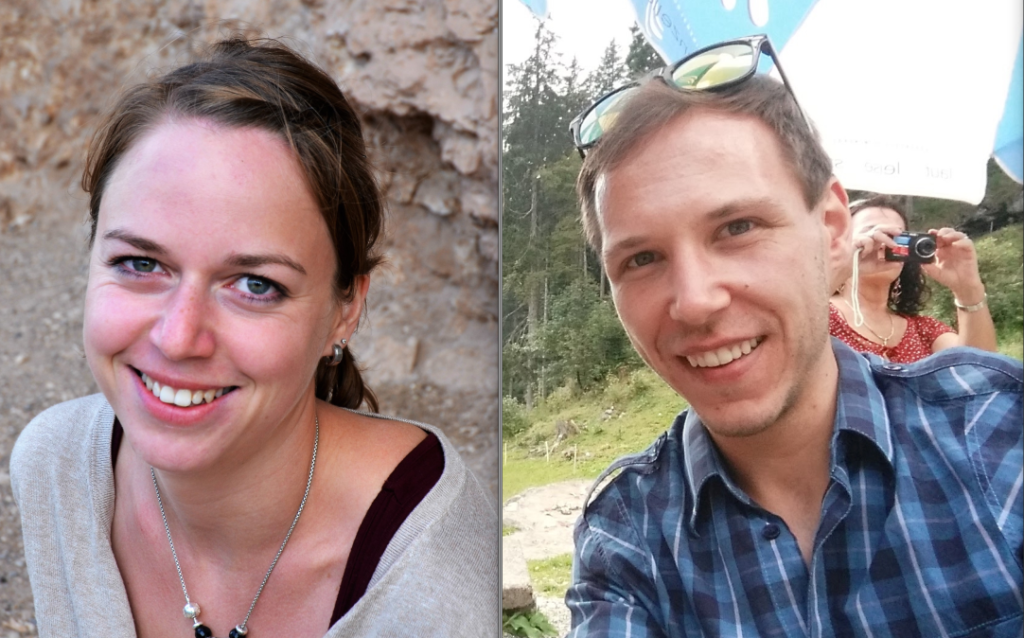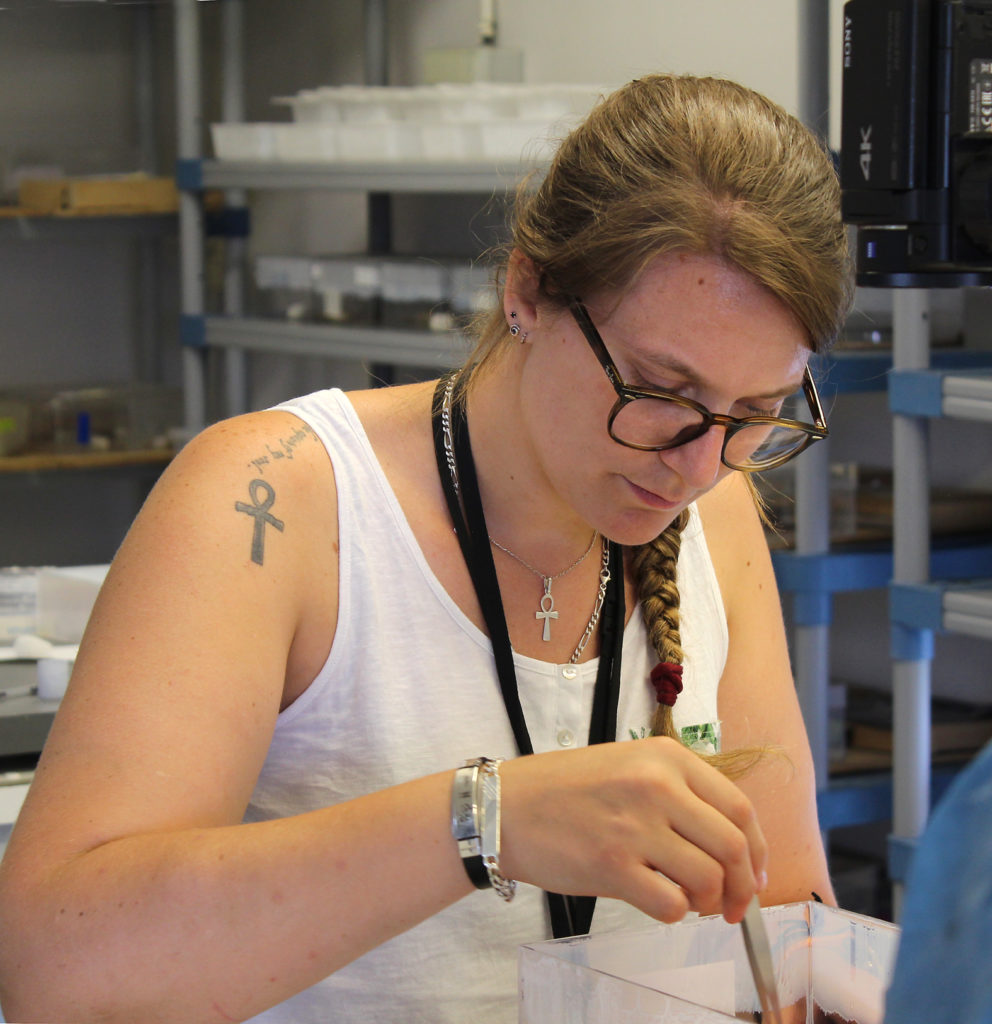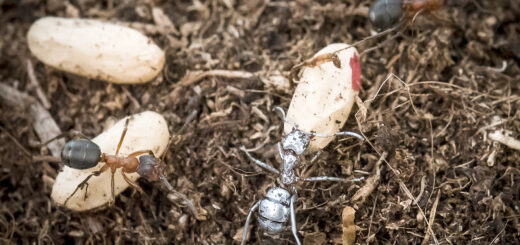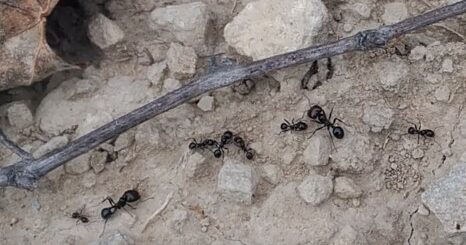Doing an ant PhD: Vanessa Martinez
Vanessa Martinez is 30 years old and was born at Tassin la demi lune (near Lyon). She lived there until she began studying at the University Claude Bernard Lyon 1. After that, she lived in Aix en Provence (in Southern France) until the end of her first university degree (Aix-Marseille University). Before starting at the university and after finishing school, she did not know what she wanted to do, thus she tried two fields (one year of psychology with some law courses and one year of medicine) before she found her own way. During various courses at the university, she had been really passionate about all courses about animal biology and the dynamics of populations. That is the reason why she chose to study animal behavior and pursued a master’s in ethology. After she received her master’s degree, she was lucky to obtain funding by a doctoral school to do an interdisciplinary thesis in the interface between ethology and physics.
Since she was 18 years old, she has worked during holidays and on weekends all the years in parallel to studying at the university. Sometimes, it was difficult to do both university courses and work, but now, she is proud to have succeeded to do both, because she learned a lot with all these experiences. Her thesis will be over in a few months, but she already can say that it will be the most important and beautiful experiment of her life despite numerous difficulties in the life of a PhD student. Here, we talk about her PhD, why she fell for ants, and why she would go anywhere for her study subjects.
An Interview compiled by Julia Giehr and Patrick Krapf

MNB: What is the topic of your PhD thesis?
VM: The role of vibrations in the rescue behavior in the ant Cataglyphis cursor and in the prey-predator interaction (ant-antlion).
MNB: Why ants?
VM: During the courses of my master’s degree, we often did examples about ants. Since these studies, I have been fascinated by the rescue behavior in the ant Cataglyphis cursor. I wanted to work and to learn more about this incredible behavior observed in ants.
MNB: I know the feeling. And how do you feel about fieldwork?
VM: I would like to do more fieldwork. Until now, I only go in the field when we need to collect ants and/or antlions.
MNB: And how about identifying ants using a key?
VM: My specialty is to study the animals’ behavior, and the models of my research are the ants and the antlions. I don’t have a systematic formation, but I can recognize some characters with a key but not many.
MNB: Are you working in the wet lab too?
VM: I don’t really work in the wet lab, but I do some experiments in the lab. Cataglyphis cursor is a Mediterranean ant species, and I work in the lab which we heat (from 28 to 30°C +/- 2 °

MNB: Now a question relating to your statistics knowledge. Did you acquire it in university courses, from your supervisor, or on your own?
VM: I acquired statistics knowledge in university courses, and I also learned more by myself. It’s really important to continue to acquire statistics knowledge, in particular in biology.
MNB: What is the ideal frequency of meeting your supervisor for discussing your research from your point of view: daily, weekly, monthly?
VM: I think the ideal frequency of meeting my supervisors is weekly but sometimes it’s really difficult to do that with the busy schedule.
MNB: And if you have a great idea, how do you find out if it’s really great: sitting down and thinking, discussing with your supervisor, discussing with colleagues from the group, discussing with someone not into science?
VM: I use all these strategies because I think it’s really important to have an open mind when we work in ethology and, more generally, in all research domains.
MNB: How many papers do you read in an average week?
VM: I don’t read papers every day; I read a lot during certain periods, for example, before experiments or during writing my thesis. During these periods, I try to read 5 to 6 papers each day. If not, I read sometimes one or two papers about my subject.
MNB: In an ideal world, is the working group you belong to small or large?
VM: The size of the group does not matter to me. The people who composed this group are important to me, not the number.
MNB: And ideally, is your uni close to your field-work site or in an urban area?
VM: Well, if the subject is really interesting, I would go anywhere, and I would do anything to work on that. I think, in this work, and here I mean to be passionate about the work, it’s really important to be adaptive and flexible. We have to do a life’s choice.

MNB: What is most relevant to you at a conference: attending talks, giving a talk, meeting senior scientists, meeting other students?
VM: I think giving a talk is more relevant to me. After that, I can talk with other students or scientists but if I don’t do that, I am really shy and I don’t speak with others.
MNB: If you would get 100,000 Dollars to spend for your research project, what would you do with it?
VM: I think that I would buy more equipment like a table against vibrations, a camera with higher resolution, or an accelerometer B&K to detect with more precisely vibrations. Maybe I would organize a symposium, it could be fun.
MNB: What helps you best in your spare time to relax from work?
VM: I pass a lot of my spare time on the phone with my family because I live approx. 800 km distant from my parents.
MNB: If you will be supervising PhD students yourself, what will be the most important thing you will expect from your students?
VM: I think the most important thing for me is the motivation and the passion for the subject. During the PhD, students are confronted with many difficulties, and if the student isn’t motived and passionate, maybe she/he will not finish the thesis.
MNB: Nice. And what will be the most important thing you want to take care of in supervising?
VM: I will try to reduce the pressure, which comes along with a PhD thesis.
MNB: Original article or review article?
VM: The two are both really important and have two different functions. Thus, I don’t have any preference.
MNB: Reading or writing?
VM: I prefer reading because writing is more difficult for me, and I haven’t any talent for that.
MNB: Writing or reviewing?
VM: In that case, I will say writing because I don’t have any experience with reviewing but soon, I hope that to have a chance to try that.
MNB: The first or last 5% of the time you spend with writing a manuscript?
VM: The last 5% because I am in a really good mood when the work is over.
MNB: Informative or sexy paper title?
VM: I am against a sexy paper title because we sometimes try to sell our paper with false ideas.
MNB: Table or figure?
VM: Figure because it’s more fun.
MNB: Web of Science or Google Scholar?
VM: Google Scholar.
MNB: Journals financed by the author (open access) or the reader (subscription)?
VM: I prefer journals financed by the author because I read more than I write, and I prefer when papers are open access.
MNB: Windows, OS, or Linux?
VM: Principally, Windows.
MNB: Command-line or graphical-user interface?
VM: Command-line, each time that I use software like Arduino, Raspberry, or R.
MNB: Mouse or touchpad?
VM: Mouse.
MNB: Facebook or Twitter?
VM: I don’t have a Twitter account, but I have Facebook, so Facebook.
MNB: Bus or bike?
VM: Bike
MNB: Breakfast or dinner?
VM: Breakfast, because I really like sweet things like certain fruits.
MNB: Sun or rain?
VM: Rain.
MNB: Diploid or haploid?
VM: Diploid.
MNB: Sting or acid?
VM: Acid.
MNB: Social parasite or host?
VM: Social parasite.
MNB: Your favourite ant paper?
MNB: Your favourite ant?
VM: Dinoponera gigantea; Formica aserva; Atta cephalotes; and ants of genus Myrmecocystus. Sorry, I have many favourite ants :-).
MNB: No worries, I know it is a tough question. And if in another life you would be an ant, what ant would that be?
VM: Perhaps, Atta cephalotes.
MNB: Thank you so much for this nice interview. Any last words?
VM: I would like to thank my family. I hope I can realize my dream to stay in science to study animals because they always encouraged and helped me. I am really grateful to my family and my thesis supervisors, if they weren’t there, I couldn’t live all these experiences. In some months, I hope that it will be the start of something and not the end. Thank you very much, XD.







Recent Comments